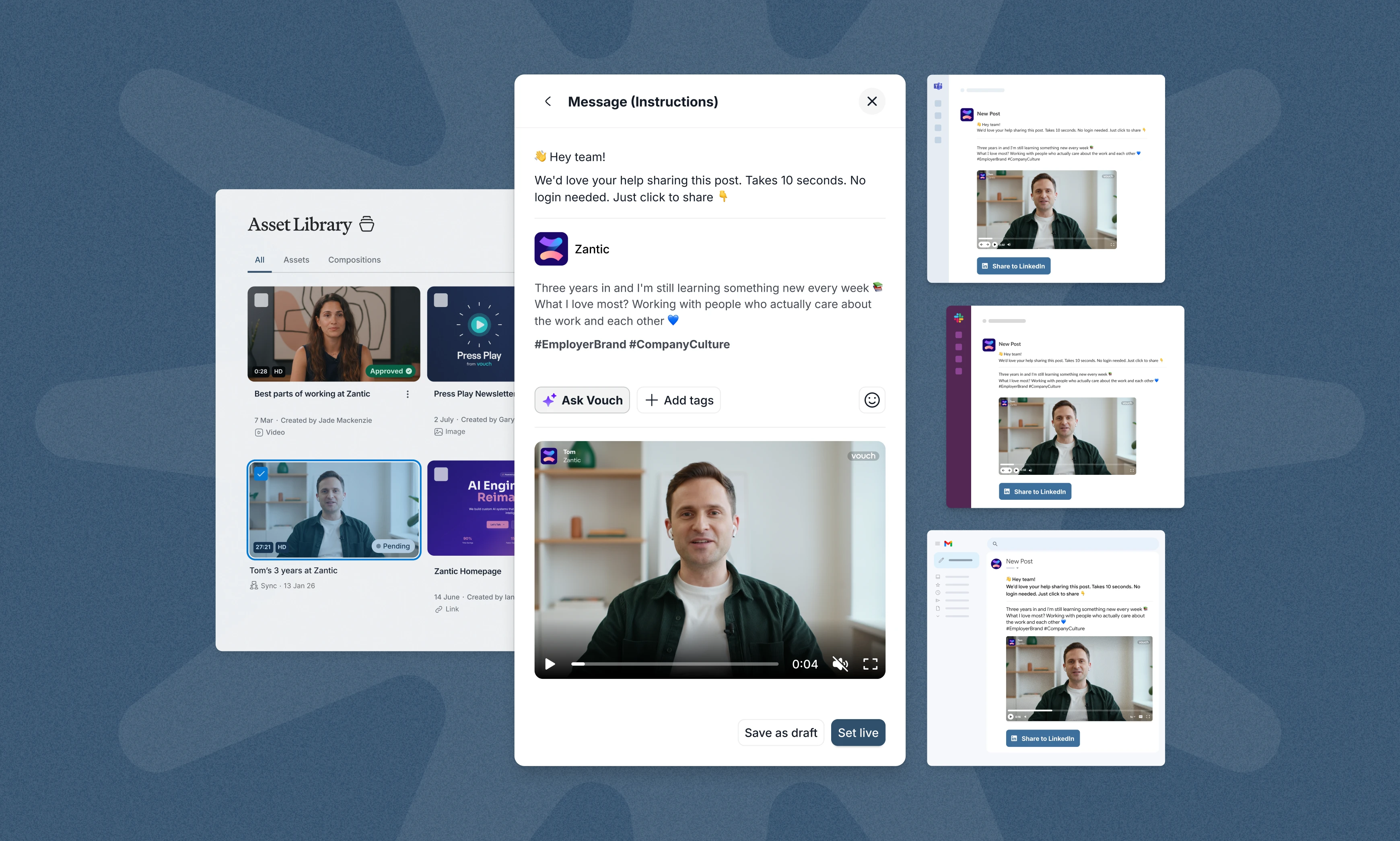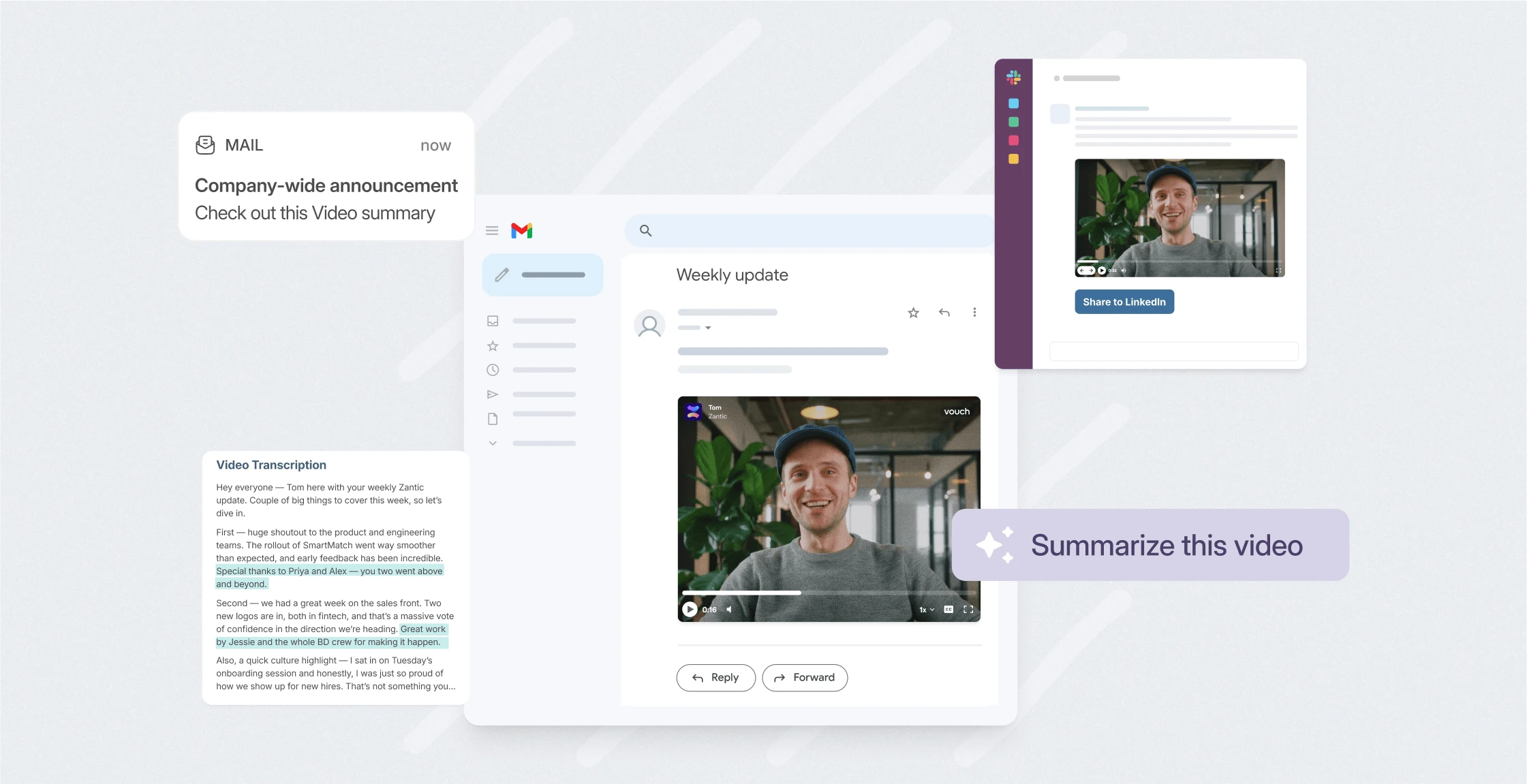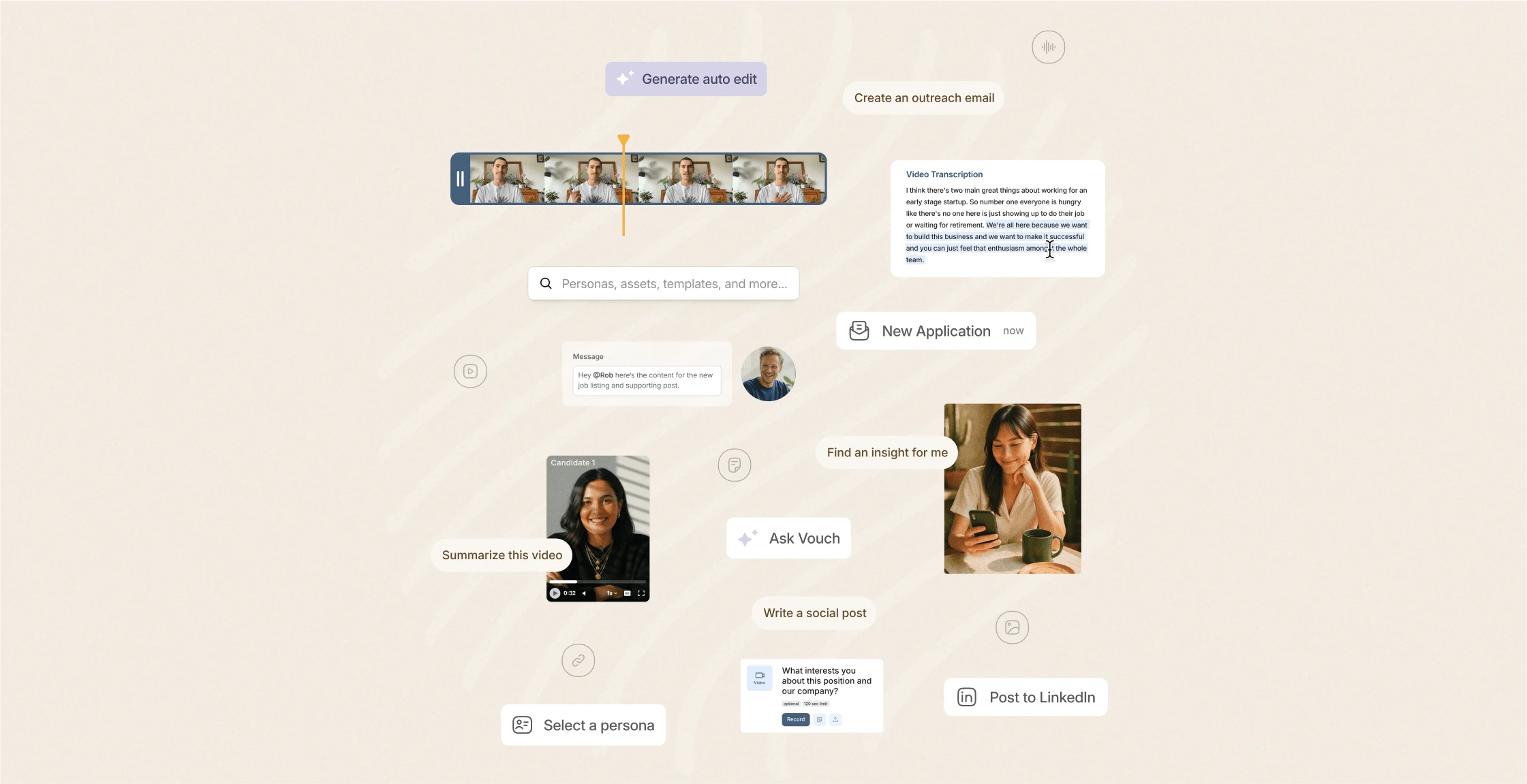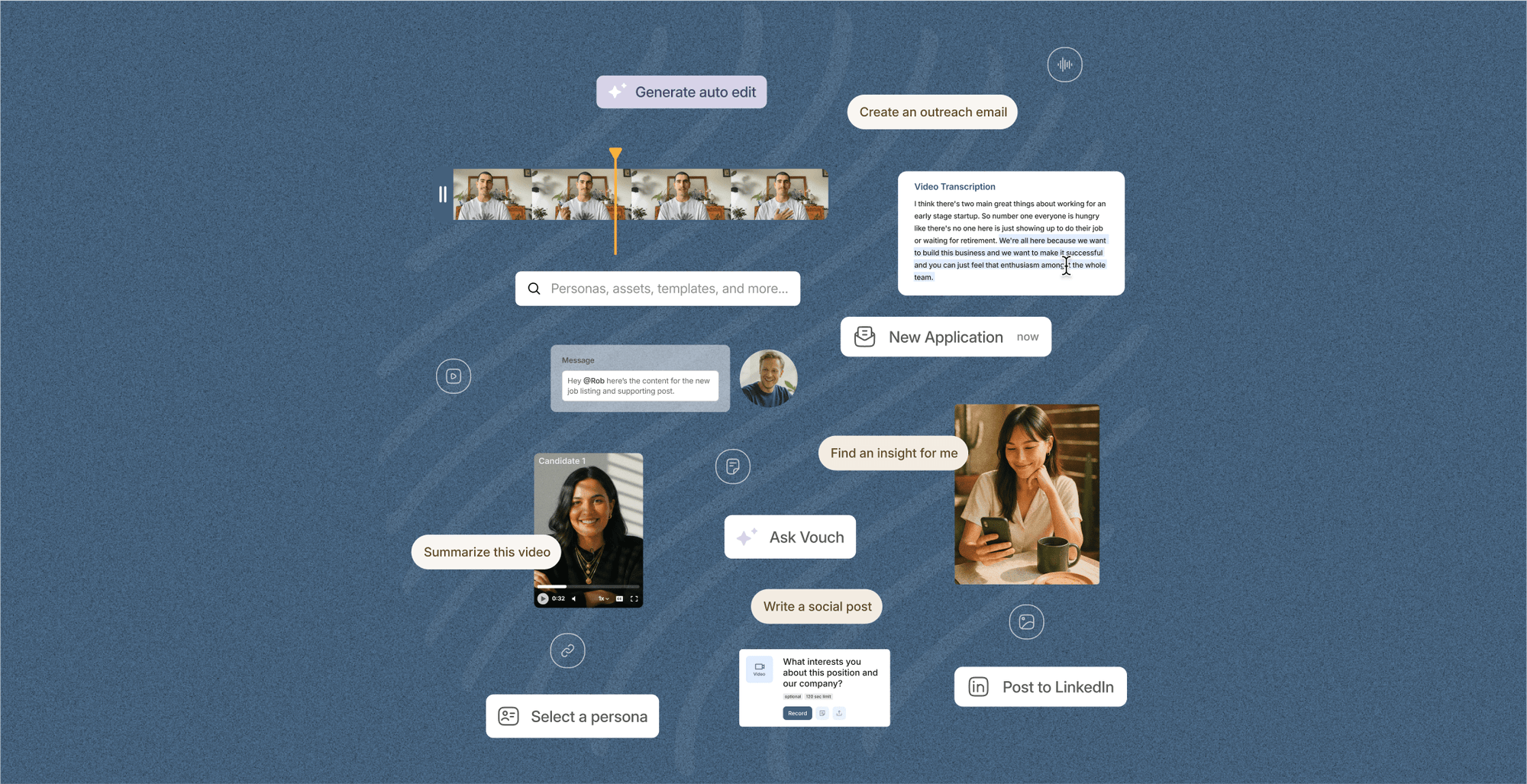Diversity, equity, inclusion, and belonging (the DEIB meaning) in the workplace are becoming more and more crucial for company culture, your employer brand, your hiring process, and, let's face it, your company's long-term success.
In almost every industry today, the companies that understand DEIB, know what it means to not only their workplace culture but also their revenue and growth.
Studies have shown that diverse companies outperform industry norms by 35%, that's how powerful DEIB is.
DEIB is about creating a culture that promotes equality in all aspects of life, leading to increased creativity, productivity and overall business success.
Through DEIB best practices, forged by your leadership team, you can also attract and retains top talent and also habe a positive impact on your communities, creating a more equitable society around your business and brand.
So let's dive in.
DEIB Meaning Takeaways:
- Diversity, equity, inclusion, and belonging (DEIB meaning) are crucial concepts in the workplace and our society in 2026.
- DEIB leads to workplace of creativity, innovation, and better decision-making amongst every employee.
- DEIB attracts and retains diverse talent, enhancing your team's success.
- Modern tools like Vouch video can make your DEIB and Employer Branding much more effective.
What Are 5 Ways To Promote DEIB Training And Practices?
There are several best practices that can help you promote and maintain Diversity, Equity, Inclusion and Belonging (DEIB) in 2026.
And keep in mind it's not just for your current employees, but future employees too. 67% of job seekers consider diversity an important factor when considering companies and job offers. (Glassdoor, 2019)
1. Inclusive Hiring and Promotion Policies
When unpacking the DEIB meaning, one of the essential best practices is to establish inclusive hiring and promotion policies. This involves considering diverse candidates for all positions and ensuring fair and unbiased decision-making.
By actively seeking out talent from different backgrounds, you can build a diverse workforce that reflects the communities you serve. Modern Video tools like Vouch can also help you hire a more diverse workforce with unbiasing built in.
2. DEIB Training Programs
Another crucial aspect of promoting DEIB is implementing diversity training programs. These programs help raise awareness about unconscious biases and equip employees with the skills and knowledge to create an amazing workplace culture across your entire workforce, that respects and values diversity.
3. Unconscious Bias Training
Unconscious bias when it comes to DEIB meaning, is training is a specific type of diversity training that focuses on addressing unconscious biases that can influence decision-making.
By educating employees about these biases and encouraging them to recognize and challenge them, you can create a more equitable workplace and improve company-wide employee satisfaction.
4. Employee DEIB Resource Groups
As part of your DEIB goals, creating employee resource groups, or ERGs, are another effective way to promote DEIB. These groups bring together employees with shared experiences or backgrounds and provide a platform for networking, support, and a culture of belonging.
5. Mentoring Programs and Leadership Development
Mentoring programs and leadership development initiatives also play a crucial role in promoting DEIB. By providing opportunities for underrepresented employees to receive guidance and support, you can help them advance in their careers.
Additionally, investing in leadership development programs ensures that diverse talent has the opportunity to reach leadership positions within your company.
By following these best practices, understanding DEIB meaning and working on your overall employer brand, you can supports employees from all backgrounds.
A study by Harvard Business Review found that diverse companies are 70% more likely to capture new markets.
The AI-enabled workspace for talent teams.
- Unified workspace for talent teams
- Accelerate hiring with AI tools
- Auto-generate polished hiring and employer brand content
- Easily repurpose assets across all channel
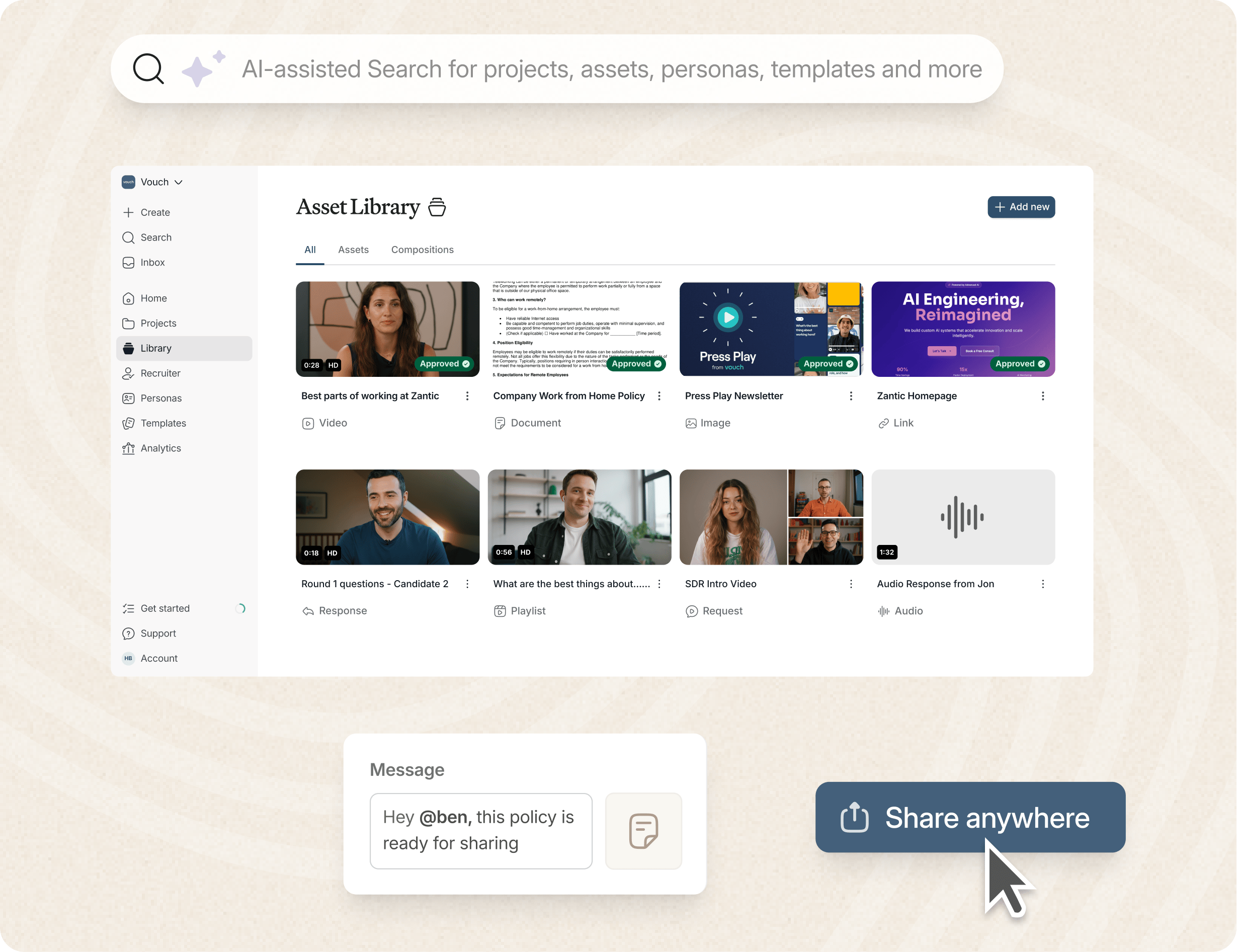
Why Does Diversity Matter?
When we start to unpack the DEIB meaning, it's clear that diversity is about more than just having a mix of people with different backgrounds and demographics.
Diversity is about embracing the unique perspectives, ideas, and experiences that each individual employee brings to the table.
With a diverse workforce, you have a wealth of knowledge and insights that can greatly enhance your decision-making and problem-solving capabilities. But diversity in the workplace goes beyond just improving performance, and can help with your entire talent pipeline.
When it comes to diversity in the DEIB meaning, attracting and retaining top talent and building your employer brand are also vital.
Studies show that highly talented people actively seeks out companies that prioritize diversity and inclusion. By embracing diversity and DEIB, you can position your company as an employer of choice and gain a competitive edge.
What are the Types of Diversity in the Workplace?
Diversity in the workplace encompasses a wide range of characteristics and experiences that contribute to a prosperous and inclusive environment.
Here are some of the key types of diversity that can be found in most leading companies in 2026:
- Race: With the DEIB meaning, race refers to the different racial backgrounds and ethnicities that individuals bring to the workplace.
- Physical Ability: Physical ability encompasses a range of abilities, including disabilities, that impact how individuals navigate and engage with their work environment.
- National Origin: National origin in the DEIB meaning, refers to the country or region where an individual or their ancestors were born.
- Gender Identity: Gender identity encompasses the diverse ways in which individuals experience and express their gender.
- Sexual Orientation: Sexual orientation refers to an individual's emotional and sexual attraction to others, which is incredibly important for Gen Z people in particular.
- Age: Age diversity in a DEIB meaning recognizes the value of different age groups and the unique perspectives they bring to the workplace.
- Religion: Religion encompasses a variety of beliefs and practices that individuals may hold.
- Socioeconomic Status: Socioeconomic status reflects an individual's economic and social standing, including factors such as income, education, and occupation.
Each type of diversity brings a unique perspective and experience that contributes to the overall richness of your company.
That's why understanding DEIB meaning is so important.
78% of Talent Acquisition Professionals Say Diversity is the Top Trend Impacting How They Hire: LinkedIn - Global Talent Trends
What are the Benefits of Having a Diverse Workforce?
A diverse workforce brings numerous benefits to your company, industry and market reputation. When it comes to DEIB, you need to think about your diverse investors and customers too!
Here are some key advantages of having a diverse workforce:
- Creativity and Innovation: A diverse group of individuals brings different perspectives, experiences, and ideas to the table. This diversity sparks creativity and innovation, leading to fresh approaches and solutions to problems.
- Problem-solving: Diverse teams are more effective at problem-solving because they can draw on a wider range of experiences and knowledge. Different viewpoints and perspectives can uncover new insights and solutions.
- Customer Relations and Loyalty: A diverse workforce can better understand and connect internally, and also with a diverse customer base. This leads to improved customer relations, increased customer loyalty, and a positive brand reputation.
- Talent Attraction and Retention: Companies that value diversity and inclusivity are more attractive to top talent. A diverse workforce creates a sense of belonging and inclusiveness, which can contribute to higher employee engagement, satisfaction, and retention.
- Increased Productivity: When employees feel valued and supported in a diverse and inclusive environment, they are more likely to be engaged and motivated. This can result in increased productivity and overall business success.
- Social Justice and Equality: Promoting diversity in the workplace is an important step towards achieving social justice and equality. It provides opportunities for underrepresented groups to thrive, breaking down barriers and creating a fair and inclusive society.
For example, companies the embrace Gender Diversity are 21% more likely to outperform competitors.
A diverse workforce is a win-win situation where both the employees and the organization thrive.
What Is Equity in the Workplace?
As part of your overall DEIB plans, equity can play a pivotal role in ensuring fair and equal access to opportunities, advancements, and resources for all employees, regardless of their background.
By prioritizing equity, you can break down the structural barriers that hinder the success of underrepresented groups and create an environment where everyone feels valued and supported.
Unlike equality, which treats everyone the same, equity seeks to address the individual needs and circumstances of employees, and it often starts with gathering employee feedback to analyze your company's equity.
Equity acknowledges that different employees may require different levels of support to thrive. By promoting equity, you can create a level playing field where success is not determined by one's background, but by their abilities and contributions. This helps to build a diverse and inclusive workforce that reflects the wider society and maximizes the potential of all employees.
Addressing equity in the workplace involves identifying and dismantling systemic and structural inequalities that perpetuate unfair treatment and access to resources.
HR teams need to take create a fair and equitable environment, and equity is a key factor.
What are the Differences Between Equity and Equality?
When it comes to unpacking DEIB meaning, we need to highlight the distinctions between equity and equality.
While both concepts aim to promote fairness and equal opportunities, they approach them from different angles.
Equality treats everyone the same: providing equal treatment and access to resources regardless of individual needs and circumstances. However, this approach fails to account for the unique challenges and barriers that individuals may face due to systemic inequities.
Equity recognizes and addresses these disparities: providing fair treatment and access to resources based on individual needs.
In the workplace, equity is crucial for addressing workplace inequities such as biases in hiring practices, pay disparities, lack of representation, and exclusionary workplace cultures. By prioritizing equity, you can create inclusive workplaces where all employees have equal opportunities to thrive and contribute.
The key differences between equity and equality can be summarized as follows:
- Fair Treatment: When unpacking the DEIB meaning, equality provides equal treatment to all individuals, while equity focuses on fair treatment based on individual needs and circumstances.
- Access to Resources: Equality ensures equal access to resources for everyone, while equity ensures access to resources based on specific needs to address existing disparities.
- Workplace Inequities: Equality may perpetuate workplace inequities, while equity aims to identify and eliminate biases, pay disparities, and lack of representation.
- Inclusive Workplace Cultures: When it comes to DEIB meaning, equality may not address the underlying structural issues that contribute to exclusionary workplace cultures, while equity prioritizes creating inclusive environments for all employees.
By understanding and prioritizing equity in the workplace, you can take meaningful steps towards improving diversity, inclusion, and belonging, to create fair and equitable environments where all employees are valued and supported.
7 Strategies for Promoting Equity in the Workplace
Creating an equitable work environment is essential for fostering diversity and inclusion. By implementing the following strategies, you can promote equity and ensure that all employees have equal opportunities to thrive:
- Inclusive hiring and promotion policies: Develop and implement policies that actively promote diversity and remove any biases in the hiring and promotion processes. Consider implementing blind recruitment practices to focus solely on qualifications and skills.
- Equal pay and benefits: Ensure that employees receive fair compensation and benefits regardless of their background. Conduct regular pay and benefits audits to identify and rectify any disparities.
- Inclusive workplace culture: Foster a culture that values and respects all individuals, regardless of their differences. Encourage open dialogue, provide diversity and inclusion training, and establish employee resource groups to support underrepresented communities.
- Training and education on bias awareness: Offer training programs that educate employees on unconscious biases and how they can affect decision-making. By raising awareness, you can help create a more inclusive and equitable workplace.
- Fair treatment and access to resources: Ensure that all employees have equal access to resources, opportunities, and career development. Implement mentorship programs and provide ongoing support to help employees succeed.
- Promoting psychological safety: Create an environment where employees feel safe to express their thoughts, concerns, and ideas without fear of retaliation. Encourage open communication and provide avenues for reporting any instances of discrimination or inequality.
- Tracking diversity metrics: Establish clear metrics and regularly track diversity and inclusion progress within your organization. This will help you identify areas of improvement and measure the effectiveness of your equity initiatives.
Implementing these strategies will create a more equitable workplace where everyone has an equal opportunity to thrive and contribute to the organization's success.
Why Focus On DEIB in Your Workplace?
Embracing diversity, equity, inclusion, and belonging (DEIB meaning) in the workplace is of utmost importance in 2026.
DEIB promotes a sense of belonging for every employee. When employees feel supported and valued for their unique backgrounds and perspectives, they are more likely to be actively engaged in their work, resulting in increased productivity and overall satisfaction.
A diverse workforce not only brings different skills and experiences to the table but also creates innovation and creativity.
When individuals from diverse backgrounds collaborate, they contribute a wide range of ideas and perspectives, leading to better decision-making and problem-solving.
This diversity of thought can give your organization a competitive edge in a rapidly changing world and economy.
DEIB helps you attract and retain top talent
A workplace that prioritizes diversity and inclusion becomes an attractive destination for the best and brightest. When you embrace the DEIB meaning and moto, you can tap into a larger talent pool, ensuring you have access to the most qualified candidates.
DEIB promotes fairness and social justice
By creating an inclusive environment, DEIB helps address historical inequities and systemic biases. It ensures that everyone, regardless of their background, has equal opportunities to succeed and thrive.
DEIB contributes to better decision-making
When teams are diverse, they bring different perspectives and experiences to the table. This diversity of thought helps organizations make better-informed decisions that consider a wider range of factors and potential impacts.
DEIB improves employee engagement and performance
When employees feel valued, respected, and included, they are more likely to be engaged and motivated in their work. This leads to increased productivity, higher job satisfaction, and, ultimately, better performance for individuals and the organization as a whole.
DEIB is not a trend; it is the foundation for building a thriving and resilient workplace and reducing employee turnover.
By embracing DEIB, your company can create a culture of empathy, engagement, employee wellbeing and awareness, while tapping into a larger talent pool for your recruitment and talent acquisition teams.
One Glassdoor study showed that 67% of Job Seekers Consider Diversity an Important Factor When Considering Companies.
What Is A DEIB Strategy To Follow?
A DEIB (Diversity, Equity, Inclusion, and Belonging) strategy is a comprehensive plan that typically includes the following elements:
- Assessment and Analysis: Use surveys with tools like Vouch to assess and analyze your current workplace.
- Goal Setting: This is where you set specific, measurable, achievable, relevant, and time-bound (SMART) goals for improving diversity, equity, inclusion, and belonging.
- Policies and Practices: This may include recruitment and hiring practices, promotion and advancement policies, and employee development programs.
- Training and Education: Companies provide training and education to employees at all levels to raise awareness about diversity, equity, inclusion, and belonging issues.
- Accountability: Organizations also need to track and measure progress toward DEIB goals, and that's a whole other article that we'll publish soon!
- Continuous Improvement: Organizations regularly review and update their DEIB strategy to reflect changing needs, priorities, and best practices. They seek feedback from employees and stakeholders to inform their efforts.
Overall, a DEIB strategy is designed to create a more inclusive and equitable workplace where all employees feel valued, respected, and empowered to contribute their best work.
What Are 5 Real Statistics On the Importance And Value Of DEIB?
To show the value and importance of DEIB meaning, here are five statistics related to Diversity, Equity, Inclusion, and Belonging (DEIB), along with their sources:
1. Diverse Companies and Financial Performance: Companies in the top quartile for racial and ethnic diversity are 35% more likely to have financial returns above their respective national industry medians. Engagedly
2. Employee Preferences for DEIB: Approximately 76% of employees and job seekers consider a company's diversity and inclusion efforts important when evaluating job offers. Engagedly
3. Impact of Inclusive Teams on Performance: Inclusive teams perform up to 30% better in high-diversity environments. AIHR
4. Representation in Leadership: Whites make up 80.9% of management occupations, indicating a lack of diversity in leadership positions. Fit Small Business
5. Employee Experience of Non-Inclusive Behaviors: In the past year, 43% of women have experienced non-inclusive behaviors in their workplace. Engagedly
These statistics highlight the importance of DEIB initiatives in creating an inclusive workplace that improves organizational performance.
What Are The Challenges of DEIB Implementation?
Implementing diversity, equity, inclusion, and belonging (DEIB) initiatives in the workplace can present several challenges. Here are some key challenges your company might face when implementing DEIB and how to address them:
Building a diverse talent pool
One of the main challenges of unpacking the DEIB meaning, is finding and attracting diverse talent. To overcome this challenge, organizations can focus on building your Employee Value Propositions (EVPs) and DEIB-focused Employer Brand videos, adopt recruitment strategies that promote inclusivity and reach a broader pool of candidates. This can include building partnerships with diverse communities, leveraging professional networks, and actively seeking out diverse candidates through targeted job postings and outreach initiatives.
Meeting compliance requirements
Compliance with diversity regulations, such as those set by the Equal Employment Opportunity Commission (EEOC) and the Office of Federal Contract Compliance Programs (OFCCP), can be complex.
Organizations must ensure they have policies and practices in place that align with these regulations. This may involve conducting regular audits, reviewing hiring and promotion processes, providing diversity training, and monitoring metrics to ensure compliance.
Adopting a data-driven approach
Implementing DEIB initiatives requires a data-driven approach to understand the current state of diversity within an organization and track progress over time.
By collecting and analyzing data, organizations can identify gaps, set specific goals, and measure the impact of their DEIB efforts.
This data-driven approach helps in decision-making and enables organizations to make informed adjustments to their strategies to address any challenges that arise.
In conclusion, while implementing DEIB initiatives may present challenges, organizations can overcome them by building a diverse talent pool, meeting compliance requirements, and adopting a data-driven approach.
By addressing these challenges head-on, organizations can create an inclusive and equitable workplace that benefits employees and the overall success of the organization.
57% of Employees Think Their Companies Should Be More Diverse according to Glassdoor.
FAQs
Why is diversity, equity, inclusion, and belonging (DEIB meaning) crucial in the workplace in 2026?
DEIB is crucial for building a fair and equitable workplace and society. It creates a culture of respect, understanding, and collaboration, attracting and retaining diverse talent, enhancing creativity and innovation, and improving decision-making.
DEIB promotes fairness and social justice, leading to a more inclusive and equitable society. Companies prioritizing DEIB positively impact their communities and contribute to a better world.
What is the difference between DEI and DEIB?
DEI stands for Diversity, Equity, and Inclusion, while DEIB stands for Diversity, Equity, Inclusion, and Belonging. Both frameworks are used to address issues related to diversity and inclusion in organizations, but they differ in their emphasis:
- DEI (Diversity, Equity, and Inclusion):
- Diversity: Refers to the presence of a variety of identities and backgrounds in an organization, including but not limited to race, gender, age, ethnicity, sexual orientation, and more.
- Equity: Focuses on ensuring fairness and impartiality in policies, practices, and opportunities to address historical and systemic disadvantages that certain groups may face.
- Inclusion: Involves creating a culture where diverse individuals feel welcomed, valued, respected, and supported, and where they can fully participate and contribute.
- DEIB (Diversity, Equity, Inclusion, and Belonging):
- Belonging: Adds another layer to the framework, emphasizing the importance of creating an environment where everyone feels a deep sense of connection and acceptance. It goes beyond inclusion by focusing on fostering a culture where individuals feel they are an integral part of the organization.
While DEI focuses on diversity, equity, and inclusion, DEIB expands the concept by adding belonging as a key component to create a more inclusive and supportive environment for all individuals.
What is diversity in the workplace?
Diversity refers to the differences between people in the workplace. It brings various perspectives, ideas, and experiences, leading to better decision-making and problem-solving. Diversity helps create a welcoming environment where all employees feel valued and supported. By embracing diversity, you can attract and retain top talent, and improve overall performance and competitiveness of your business in your market.
What types of diversity are important in the workplace?
Diversity in the workplace encompasses aspects such as race, physical ability, national origin, gender identity, sexual orientation, age, religion, and socioeconomic status. Each type of diversity brings a unique perspective and experience that contributes to an organization's richness, success, employee retention, and skills enhancement.
What challenges are faced in achieving diversity and inclusion in the workplace?
Achieving diversity and inclusion goals in the workplace can face challenges such as unconscious bias, a lack of diversity in hiring and promotion decisions, a lack of awareness and understanding from senior leaders, and systemic and structural inequalities. Overcoming these challenges requires implementing diversity, equity, and inclusion initiatives that foster a culture of respect, acceptance, and inclusivity, ultimately benefiting individual well-being and mental health.
What are the benefits of having a diverse workforce?
Having a diverse workforce brings numerous benefits, including increased creativity, innovation, better problem-solving, improved customer relations, increased customer loyalty, improved brand reputation, attracting and retaining top talent, enhancing engagement, productivity, promoting social justice, and equality.
What are some best practices for promoting and maintaining diversity in the workplace?
Promoting and maintaining diversity requires adopting best practices such as inclusive hiring and promotion policies, diversity training programs, unconscious bias training, employee resource groups, creating an inclusive workplace culture, and implementing mentoring programs. These initiatives help create an equal and inclusive environment, supporting the success and well-being of all employees.
What is equity in the workplace?
Equity ensures fair and equal access, opportunities, and advancements for all employees in the workplace, regardless of their background. It aims to eliminate systemic and structural barriers that hinder underrepresented groups from achieving their full potential. Equity is crucial for fostering a diverse, inclusive, and productive workplace where all employees feel valued and supported.
What is the difference between equity and equality in achieving DEIB?
Equality treats everyone the same, while equity focuses on providing fair treatment and access to resources based on individual needs and circumstances. Workplace inequities include biases in hiring practices, pay disparities, lack of representation, and exclusionary workplace cultures. Prioritizing equity helps create inclusive workplaces where all employees have equal opportunities to thrive.
What strategies can be implemented to promote equity in the workplace?
Promoting equity in the workplace involves implementing strategies such as inclusive hiring and promotion policies, ensuring equal pay and benefits, fostering an inclusive workplace culture, providing training and education on bias awareness, ensuring fair treatment and access to resources, promoting psychological safety, and tracking diversity metrics.
Why is DEIB important in the workplace?
Embracing diversity, equity, inclusion, and belonging in the workplace is essential. It promotes empathy, engagement, bias awareness, a diverse workforce, a larger talent pool, increased employee engagement, better decision-making, and improved performance.
What challenges can be faced in implementing DEIB initiatives?
Implementing DEIB initiatives can face challenges such as building a fair and representative talent pool, meeting diversity compliance requirements such as Equal Employment Opportunity Commission (EEOC) and the Office of Federal Contract Compliance Programs (OFCCP), and adopting a data-driven approach to finding diverse candidates.
Conclusion: DEIB meaning and next steps
Diversity, equity, inclusion, and belonging (DEIB meaning) are essential in building a fair and equitable workplace. By prioritizing DEIB in 2026, you can create a culture that embraces diversity and builds inclusion to attract and retain top talent while fostering innovation and motivation.
Tools like Vouch also make focusing on DEIB a lot easier, as you can quickly create an employee survey and capture your employee feedback at scale using video, build up your Employer Brand and capture authentic employee experiences.
See Why DEIB Manager Love Vouch!
Loved by companies like Canva, Nike, Cisco, HubSpot, Amazon and more, tools like Vouch make leveraging video in your business remarkably easy.
Be sure to book a Vouch demo today and chat with a video content expert.
You might also like

Elevate Your Brand Today With Vouch
Discover how Vouch can accelerate talent acquisition while helping you stay on-brand.

